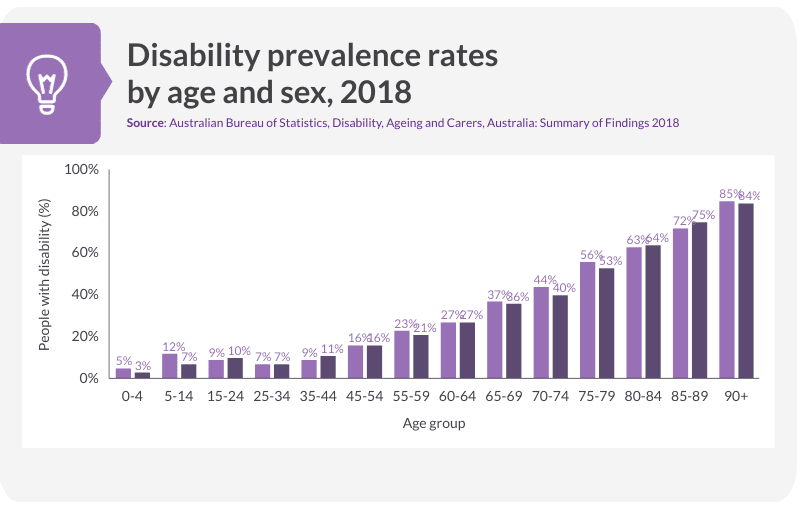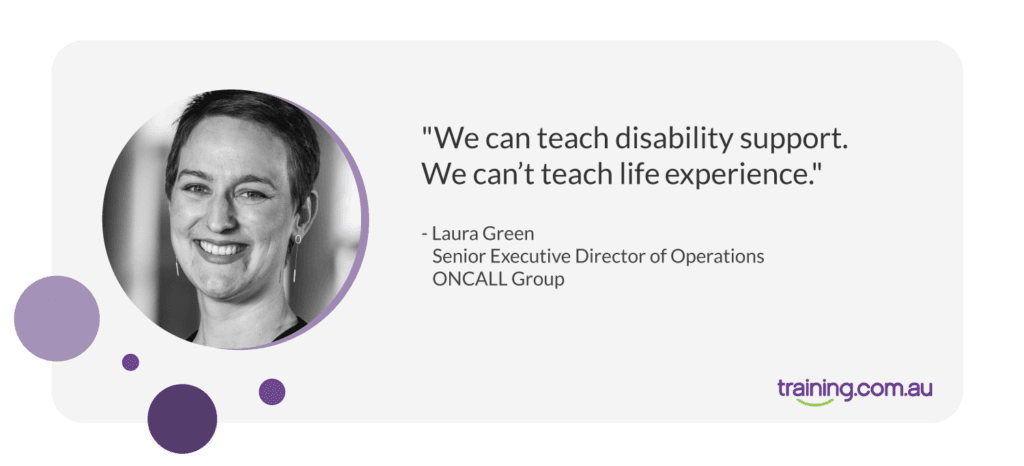Over 40s Wanted in Disability Care: Here’s Why Your Age is a Bonus, Not a Barrier

Every year, thousands of Australians decide to change their career path. It’s brave, and it’s exciting. For some, it’s a crucial move for fulfilling dreams and creating a sustainable work-life balance.
A new career as a disability support worker could be the perfect move if you enjoy seeing others thrive, love to nurture people and want to give back to the community. And with an urgent need for over 120,000 workers, this sector offers an abundance of opportunities for career changers with passion and life experience.
A career change over 40 might seem daunting, but in reality, you still have decades of your working life left — plenty of time to pursue a job that makes you and others happy.

We spoke to Laura Green, Executive Director for Victoria at ONCALL Group, a leading disability service provider in Australia. She shares her unique insights into the sector and tells us why 40+ is the perfect time to pivot to a new career in disability care.
What is ONCALL Group?
With over 1600 support workers and rapidly expanding into the rest of Australia, Victoria born ONCALL Group has been working within the disability and child youth and family sectors for more than 15 years.
Their primary focus has consistently been to
- deliver specialist services
- directly support people who usually have complex care requirements
- helping those who need assistance for those times when life gets complicated
ONCALL Group also has a labour-hire business that delivers support workers to other specialist providers in both sectors across Victoria.
“We started with an obsession for getting qualified, skilled people out to other providers and over time, ONCALL grew and was asked to deliver services directly,” says Laura.
An incredible opportunity
At first glance, it’s not hard to see the kind of fulfilment you can gain from caring for someone with a disability. But Laura points out many other reasons a career in disability support can be incredibly appealing.
Reflecting on conversations she has had with support workers in the past, Laura notes how people love the autonomy of the role. Being able to show up for work, be in control of the job, and get the work done on your terms can be enormously valuable.
A role in disability support is also an excellent environment for career progression. Service providers like ONCALL Group encourage positive change and offer pathways to people with career growth aspirations — whether you have your sights on an administration or support allocation-based job in the future, in mentorship or even senior roles within the industry.
Laura started as a support worker herself and knows first-hand how far a career in disability can span. She even says that if she ever needed a backup job, she’d get straight back into a support role.
“Support work is the best job in the world. You go to work to hang out with people, and you get to show them life — how cool is that?!”
The industry also welcomes people who don’t necessarily want to make it their career. Working in disability support offers an opportunity to make a valuable contribution while re-evaluating your career direction for a period. You can even work part-time while studying another vocation.
People with disabilities have a lot to give. They can offer unique points of view and understandings of the world around them. A role in this field can lead to some fantastic experiences, a broadening of perspective, and skills you wouldn’t have obtained in any other setting.
Some bumps in the road
The effects of COVID-19 on many sectors have been immense. Like all service providers in the industry, ONCALL had to rethink how the system could work to ensure people with disabilities were getting the support they needed — a massive undertaking.
“We did have to pivot the labour-hire business. During Covid 19, there were some huge challenges in Victoria. ONCALL Group played a big role in getting the support workers out to people,” Laura explains. “We provided over 2500 hrs of Covid related assistance during lockdown, and we were able to do that because we’ve got such a big, qualified workforce.”
The implementation of the NDIS might have had a bumpy start, and there are still challenges to overcome in its application. Still, Laura sees the new scheme as a vast improvement over the previous system, which frequently resulted in people in significant crisis going without the support they needed.
Now, with more funding available with the NDIS, the outlook is brighter.

Your age is an asset
We asked Laura what positive aspects a support worker over 40 can bring to the table. Her immediate answer was simple: themselves.
“In the disability support sector, it works best when people are really interested in what they do and when there is a natural match between the person getting the support and the person giving it.”
Laura explains that although you can find these attributes in all ages, it seems more likely that someone who has had a broader range of experience and interests will find someone they will be compatible with.

Some other benefits that someone over 40 can offer in a disability support role:
Genuine interest in the role
Someone choosing this career path after having experienced previous jobs is likely to have chosen this role because they want to do it.
If they have a genuine interest in supporting people with disabilities, they will enjoy their job, and their contribution will be much more valuable.
Bringing another skillset
Chances are, someone over 40 has worked in other sectors.
Often a client will need assistance in day-to-day tasks, and it can be invaluable if their support worker can add value by offering expertise in these areas.
For example, a client might need to update their CV or use an online portal to apply for a job. Someone who has a background in office work or administration could help with computer skills.
Confidence
Let’s face it, with age comes a certain level of reliability and even authority.
If clients feel like you know what you are doing and trust that you can control situations they find difficult, they will be more comfortable, and interactions will be much easier.
Where to next?
There are no formal qualification requirements to begin work as a disability support worker — but some training is highly desirable to an employer.
Several training courses in disability are available with flexible and blended learning options. These will offer a solid foundation for working within the sector. Disability service providers such as ONCALL Group can also provide learning pathways with funding.
Anyone who wishes to work in a support role in the disability sector must obtain an NDIS Worker Screening Check. Because the online portal can be temperamental, sometimes applications need to be submitted manually. We recommend applying for the clearance with lots of time to spare.
What is clear is that the disability sector holds incredible career opportunities — and your age is a bonus, not a barrier. There’s a vast range of learning options and resources available. There’s also an urgent demand for compassionate, experienced people like you.
What a privilege to be part of a workforce that brings independence, support, and joy to people with disabilities.
The time’s never been better to make a change
Your journey to a new career in the disability sector starts just around the corner.
Want to learn more about disability support training?
Browse disability courses to kick-start your journey.
Latest Articles
Agriculture Careers: What You Should Know in 2025
As one of Australia's most important industries, the agriculture industry offers great career opport...
Are Digital Skills the Key to Job Security in 2025?
The digital revolution is here, and it doesn’t care if you have a technical job or not — it’s coming...
How to Become a Chef in Australia: Complete Guide for 2025
The complete guide to becoming a chef in Australia. Learn how to get your start and make it in the h...
Want to read more?
How To Grow Your Accounting Skills In 5 Simple Steps
Improve your accounting skills with 5 actionable steps from CPA exam mentor Bryan Kesler, and take y...
How to Write an Expression of Interest
Have you considered submitting an expression of interest to your dream job? Here are some tips for c...
5 Dream Animal Care Jobs For Animal Lovers
Animal care is a rewarding field for anybody who enjoys spending time with their furry friends and i...
